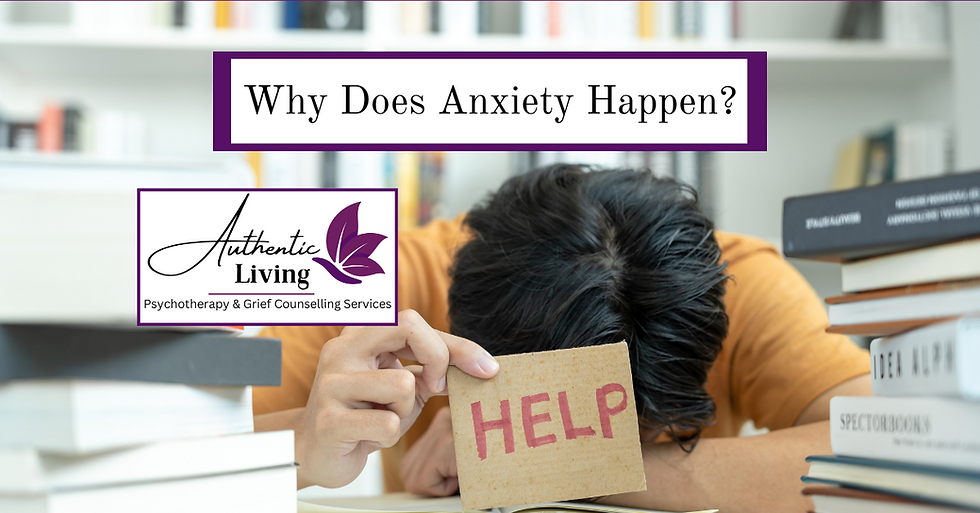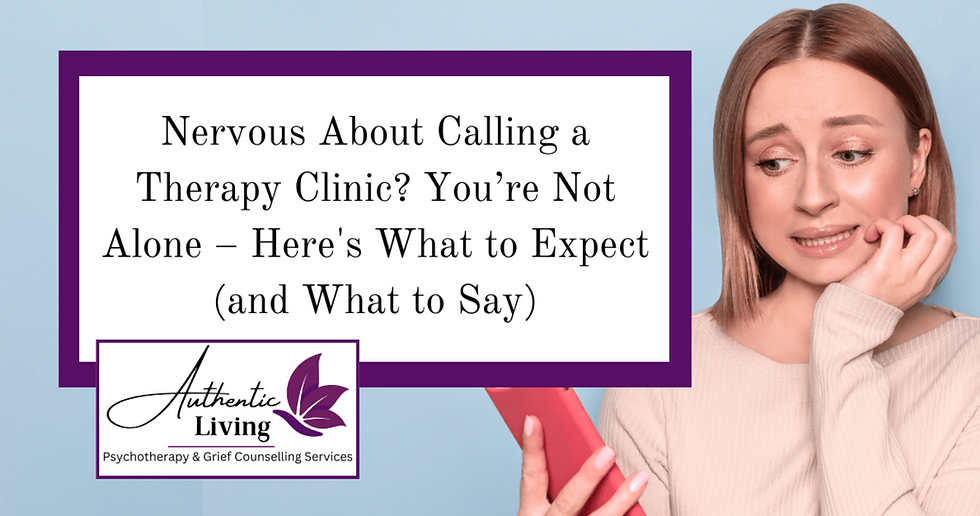Why Does Anxiety Happen?
- Aug 10, 2025
- 3 min read
Anxiety is something almost everyone experiences at some point. It can feel like your heart races, your thoughts spiral, or a heavy weight presses on your chest. But why does anxiety happen? Understanding what causes anxiety can help you manage it better and feel more in control.
In this blog, we’ll explore what anxiety is, why it happens, common triggers, and how therapy can help you cope and heal.

Why Does Anxiety Happen?
Anxiety usually results from a combination of biological, psychological, and environmental factors. These interact in complex ways to make some people more prone to feeling anxious. Here are the main reasons why anxiety happens:
1. Brain Chemistry and Genetics
Your brain relies on chemicals called neurotransmitters, such as serotonin, dopamine, and gamma-aminobutyric acid (GABA), to regulate mood, emotions, and stress responses. If these chemicals are out of balance, it can cause the brain’s alarm system to become overactive, leading to excessive anxiety.
Genetics also play a role: anxiety often runs in families. If a close relative has an anxiety disorder, you may have inherited a predisposition. However, genes are not the whole story; environment and life experiences matter too.
2. Past Experiences and Trauma
Your past has a strong impact on how you respond to stress. Traumatic events, such as abuse, neglect, accidents, or loss, especially during childhood, can make your brain more sensitive to danger signals. This heightened sensitivity means your body might react with anxiety to situations that others find less threatening.
Chronic stress during important developmental periods can shape how your nervous system works, making anxiety more likely. Even experiences like bullying or prolonged worry can contribute to this.
3. Stress and Life Circumstances
Stressful events or ongoing difficulties are common triggers for anxiety. This includes big changes like moving, starting a new job, financial strain, or relationship problems. Even everyday pressures like deadlines or social expectations can build up and overwhelm your coping abilities.
When your brain perceives these challenges as threats, it activates the fight, flight, or freeze response, causing physical and emotional anxiety symptoms. Sometimes, anxiety persists even after the stressful event passes, especially if coping resources are limited.
4. Thinking Patterns and Beliefs
The way you think about yourself and the world influences anxiety. Certain patterns, such as catastrophizing (expecting the worst outcome), overgeneralizing (believing one bad event means everything will go wrong), or perfectionism can increase anxiety levels.
If you have difficulty tolerating uncertainty or feel the need to control every situation, anxiety can rise when things feel unpredictable. Negative self-talk and low self-esteem also feed anxious feelings.
Over time, these unhelpful thought habits can become automatic, reinforcing anxiety and making it harder to break free without support.
Common Triggers of Anxiety
Everyone has different triggers, but some common ones include:
Social situations or public speaking
Health concerns or medical tests
Work or school deadlines
Financial uncertainty
Conflict or difficult relationships
Major life changes like moving or losing someone
How Does Anxiety Affect You?
Anxiety can show up in many ways:
Physical symptoms like a racing heart, sweating, shaking, or stomach upset
Emotional symptoms like fear, irritability, or feeling overwhelmed
Mental symptoms like racing thoughts, trouble concentrating, or feeling “on edge”
Behavioural symptoms like avoiding situations, procrastinating, or difficulty sleeping
How Therapy Can Help
Therapy offers a safe, supportive space to understand and manage anxiety. It can help you:
Identify and challenge negative thinking patterns
Learn relaxation and grounding techniques
Develop healthy coping strategies
Process past trauma or unresolved issues
Build confidence to face anxiety triggers
At Authentic Living London, our therapists work with you to create personalized plans that suit your unique needs and goals. Whether you prefer in-person sessions in London, Ontario, or virtual therapy, we’re here to help you find relief and regain balance.
Self-Help Tips to Manage AnxietyAlongside therapy, here are simple steps you can try:
|
Final Thoughts
Anxiety happens because your brain is trying to protect you — even if it sometimes feels overwhelming. Understanding why anxiety happens is the first step toward managing it with kindness and skill.
If anxiety is interfering with your life, remember you don’t have to face it alone. Professional support is available to help you heal and thrive.
To learn more or book a session with a therapist at Authentic Living London, reach out today. We’re here to walk beside you on your journey toward calm and confidence.











Comments